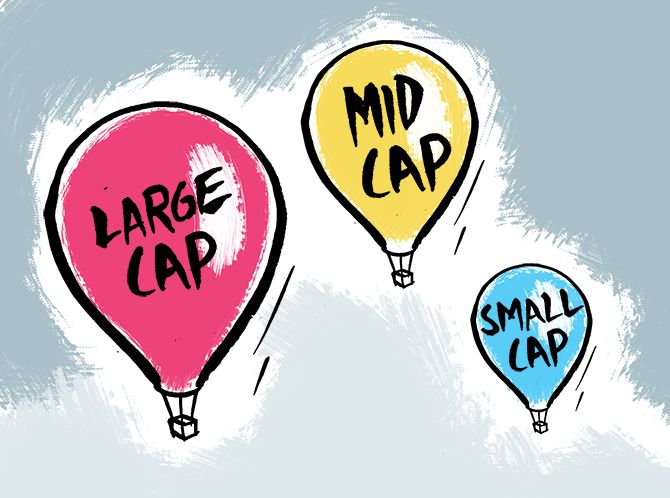'We would advise investors to hold on to multi-cap funds and not invest further until further clarity emerges.'

Vijay Kuppa, co-founder, Orowealth, a direct mutual fund investment platform, decodes how the Securities and Exchange Board of India ruling that makes it mandatory for multi-cap mutual funds to invest 25 per cent of their corpus each in large-, mid- and small-cap companies mean for retail investors who mostly buy MF units through monthly systematic investments.
Kuppa spoke with Prasanna D Zore/Rediff.com about what this SEBI move will mean for retail investors, the stock markets, and who will be the winners and losers.
To avoid sudden churns in mutual funds's portfolios SEBI has given multi-cap funds time till January 31, 2021 to give fund managers adequate time to make adjustments to their portfolios.
What is the SEBI order mandating multi-cap mutual funds asking them to buy mid-cap and small-cap companies?
As per the SEBI order, every muti-cap mutual fund will need to allocate a minimum of 25 per cent of its money in large-cap, mid-cap and small-cap companies as a rule.
Hence the exposure of multi-cap funds to small-caps will increase substantially post the ruling once it is implemented.
The fund manager will have the freedom to invest the rest as per his discretion.
At present, there is no restriction on the multi-cap funds to invest in a particular category like large-, mid- or small-caps.
Is this a cause for concern or celebration for those who invest money or do SIPs in multi-cap MFs?
It depends on the risk profile of the investor as aggressive investors may favour exposure to small-caps whereas a moderate investor will prefer exposure to large-caps.
A moderate investor may prefer to move out of the respective fund.
In effect, the recent change made by SEBI will be favourable to investors with a high-risk profile wherein the investor is willing to take higher exposure to small-caps.
It remains to be seen how multi-cap funds will manage to rebalance their schemes towards small-caps as liquidity may be low in small-caps.
It will be difficult to zero down on quality small-cap companies considering the limited choices the fund managers will have.
Who will benefit from this SEBI order and who will be the losers?
There will be a substantial inflow in mid- and small-cap funds, which will lead to gains for investors with exposure to mid-cap and small-cap schemes.
Hence, it will open up new avenues for small-cap companies as funds can be raised due to mutual fund inflows.
That can lead to better coverage of specific companies and better corporate governance.
In terms of losers, the investors will need to rethink the strategy on multi-cap funds and may prefer shifting to a pure mid-cap or large mid-cap scheme.
Also, there may be short term pressure on large-caps as multi-cap funds will try to rebalance their portfolios by selling large-caps available in their portfolio.
Hence for the respective investor, there will not be any lack of options considering the different categories of mutual funds available.
What kind of impact could this move have on the stock markets?
In the short term, we may see the mid- and small-caps rallying due to participation by retail investors with the hope that the mutual funds will have to follow up with the purchases in mid- and small-caps in order to meet the norms.
Also, the large-caps may come under pressure due to the selling by multi-cap funds, but considering the quality of large-cap companies we may not see huge market correction as the outflows can be easily absorbed by different market participants.
Hence, large-cap companies are established and provide stability.
Which mutual fund schemes will benefit and which won't because of the SEBI order?
In case the multi-cap funds do not opt for merger or recategorisation, the investors may exit the multi-cap funds which may see outflows.
On the other side, there may be inflows into the large mid-cap fund category as it may be suitable to the investor considering a balance of large- and mid-caps.
Hence, multi-cap funds may see outflows going forward whereas the large- and mid-cap category stand to gain from this move.
Recategorisation of respective multi-cap funds will assist in stemming the outflows as it will give fund manager the flexibility to invest across the categories based on the investment ideology chosen.
What should retail MF investors do in the current scenario as many investors do seem concerned? Your advice for them...
We would advise investors to hold on to multi-cap funds and not invest further until further clarity emerges considering there will be discussions between AMCs (asset management companies) and SEBI.
Respective multi-cap funds may opt for merger or reclassification of the fund which may provide an opportunity to stay invested in the fund based on the risk profile of the investor.
Also, we would advise investors to not panic and buy into small-cap funds as liquidity is low.
If the mutual funds do recategorise, then small-cap funds may not receive the funds as expected which may lead to correction.
Illustration: Dominic Xavier/Rediff.com











 © 2025
© 2025